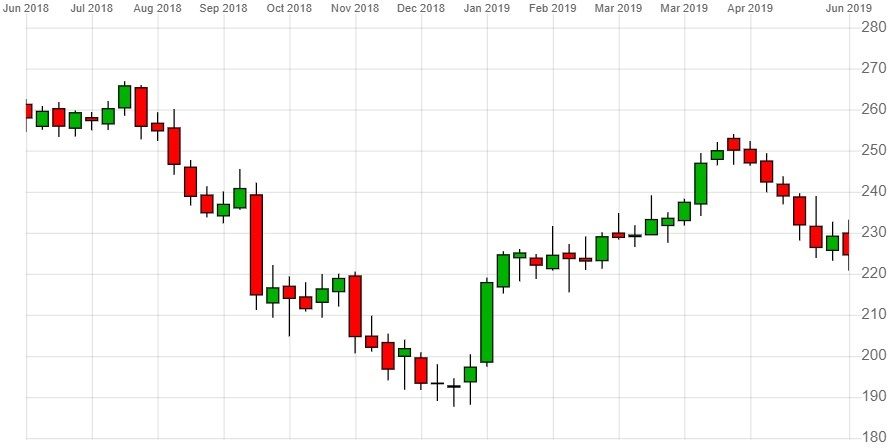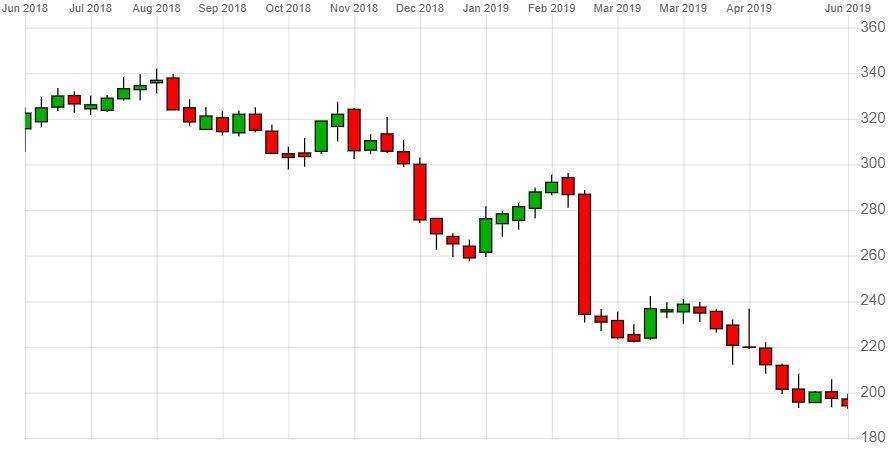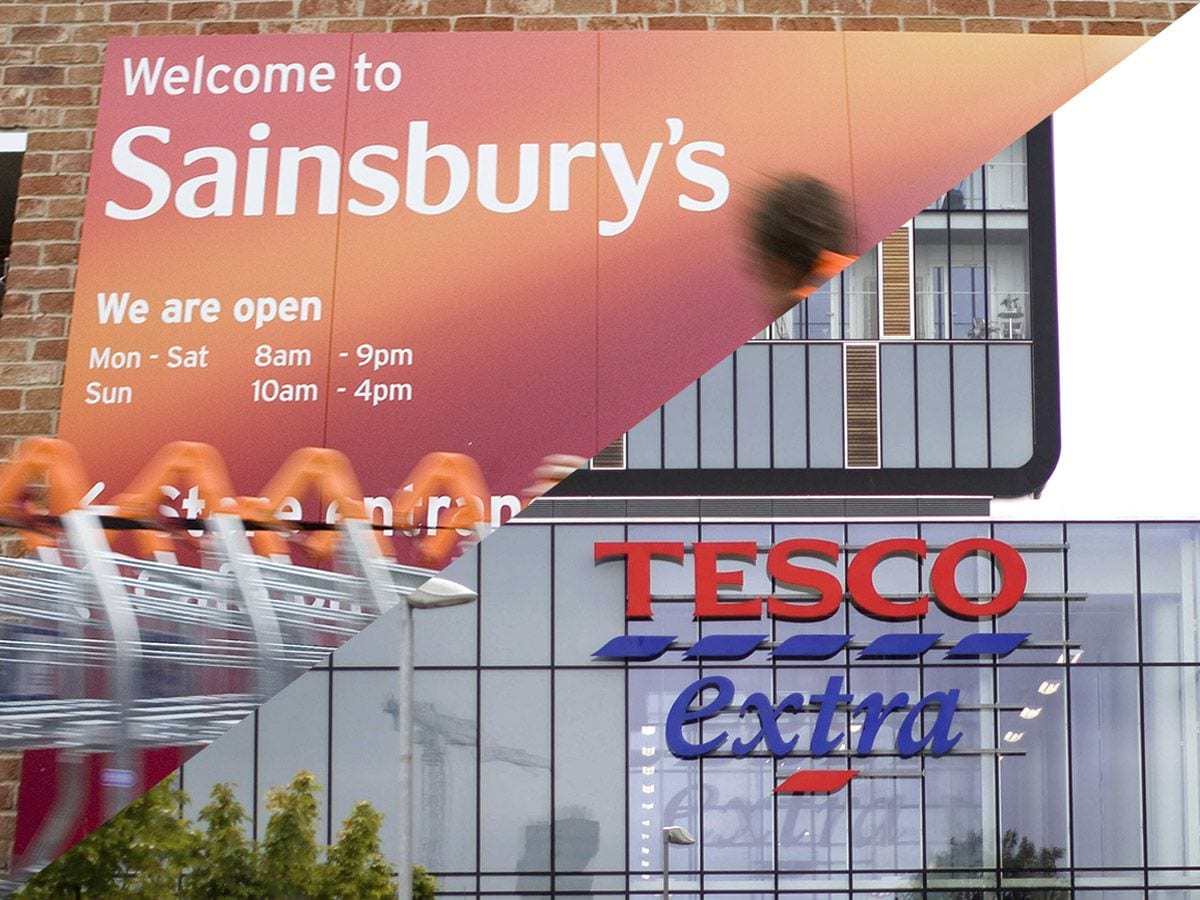Tesco [TSCO] and Sainsbury's [SBRY] could represent something of a bargain for investors. Both have seen their share price slump in May as they continue to operate under fierce trading conditions.
Nowhere is this more apparent than the increased competition from Aldi and Lidl. The two discounters now command a record combined market share of 13.8%. In comparison, Tesco and Sainsbury’s suffered a respective 0.4% and 0.5% drop in market share last year. The competition will only increase, with Lidl forking out £500 million as part of a 5-year expansion plan.
But with most analysts predicting a turnaround in share price for both Tesco and Sainsbury’s, which one will deliver the biggest return for investors?
How have Tesco shares performed recently?
Tesco’s 3.5% share price drop in May might make it a good option for bargain hunters. After all, the share price has rocketed 21% since the start of the year as CEO Dave Lewis’s turnaround strategy takes hold. The first fruits of this were a 29% year-on-year rise in profits in 2018’s full year results. A particular high point was the recent acquisition of wholesaler Booker, bringing £196 million in revenue and £79 million in profit.
Yet Thursday’s first-quarter numbers revealed a slowdown in like-for-like UK sales growth, coming in at 0.4%, well below the 1.7% growth seen last quarter. Some analysts also called into question whether Tesco would now be able to hit its full-year guidance of £65 billion.
Investors might also baulk at the high 17.07 profit-to-earnings ratio, although some forecasts suggest this could drop to 11 by 2021. On Simply Wall Street, the stock has a 1.5 PEG multiple for next year, suggesting that shares could still be overvalued.
How have Sainsbury's shares performed recently?
May saw Sainsbury’s share price dive 10% as it suffered a 1.7% drop in market share in the 12 weeks to 19 May. But things look even worse over a longer period for the beleaguered retailer. Shares have slumped 25% since January as Sainsbury's struggles to compete with Aldi and Lidl on price.
Hindering Sainsbury's ability to fend off the discounters is the comparatively low number of stores it operates (1,430 stores versus Tesco's 3,580), meaning it has struggled to achieve economies of scale. A potential remedy in the form of a merger with Asda was dashed by the CMA, resulting in the share price tanking 11% in one day in February.
How do Tesco and Sainsbury’s shares stack up?
| Tesco | Sainsbury's | |
| Diluted earnings per share (TTM) | 13.60 | 8.90 |
| Quarterly earnings growth | 57.50% | -47.60% |
| Return on Equity | 10.44% | 2.76% |
| Price to book (MRQ) | 148.17 | 50.49 |
| Forward annual dividend yield | 2.31% | 5.50% |
Tesco and Sainsbury's share price vitals, Yahoo finance, 17 June 2019
Tesco's earnings per share are a decent 13.80, well ahead of Sainsbury’s 8.9. Tesco also saw quarterly growth of 57.5% in its most recent quarter, going some way to validate Lewis’s turnaround strategy. Sainsbury's hasn’t been as fortunate, seeing earnings fall a mammoth 47.6%.
It’s not all good news for Tesco though. Despite achieving an impressive 29% hike in pre-tax profits in 2018, margins are thin at just 2.09%.
2.09%
Tesco's profit margin
Tesco's 10.44% return on equity shows that the retailer is at least making investors’ money go further than Sainsbury’s, which has a lowly 2.76%. However, neither number is particularly inspiring and investors will be concerned over Tesco’s price-to-book ratio of 148.50, which again could point to an overvalued stock.
For income seeking investors, Tesco's dividend is back after a four year absence with an expected forward dividend yield of 2.31%. Although this has come into question following the sluggish Q1 numbers. Sainsbury's forward yield is expected to offer a better payout at 5.5%.
What do the analysts think?
Among the analysts, Sainsbury's has an average price target of 198p, which would represent a whopping 60% upside if hit. Tesco shares hold an average price target of 269.93, which would represent a more modest 18.5% uptick.
Yet, it's difficult to see where this growth is actually going to come from. CMC analyst Micheal Hewson points out that Tesco’s disappointing Q1 numbers mean the share price is unlikely to move back to last year’s highs anytime soon. Hewson also argues that it will be difficult for the dividend to move towards the 3% mark.
While the share price for both Sainsbury’s and Tesco might be good value, they could represent a medium to long-term bet.
Disclaimer Past performance is not a reliable indicator of future results.
CMC Markets is an execution-only service provider. The material (whether or not it states any opinions) is for general information purposes only, and does not take into account your personal circumstances or objectives. Nothing in this material is (or should be considered to be) financial, investment or other advice on which reliance should be placed. No opinion given in the material constitutes a recommendation by CMC Markets or the author that any particular investment, security, transaction or investment strategy is suitable for any specific person.
The material has not been prepared in accordance with legal requirements designed to promote the independence of investment research. Although we are not specifically prevented from dealing before providing this material, we do not seek to take advantage of the material prior to its dissemination.
CMC Markets does not endorse or offer opinion on the trading strategies used by the author. Their trading strategies do not guarantee any return and CMC Markets shall not be held responsible for any loss that you may incur, either directly or indirectly, arising from any investment based on any information contained herein.
*Tax treatment depends on individual circumstances and can change or may differ in a jurisdiction other than the UK.
Continue reading for FREE
- Includes free newsletter updates, unsubscribe anytime. Privacy policy





